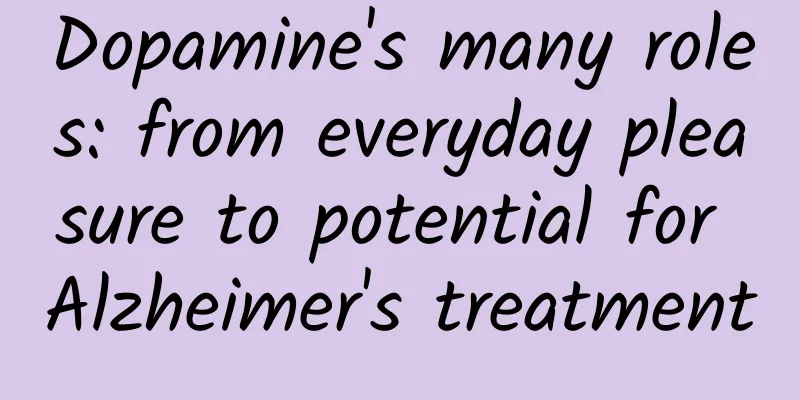Dopamine's many roles: from everyday pleasure to potential for Alzheimer's treatment

|
Written by Zhao Bei Dopamine, a neurotransmitter, has become very popular recently. When it comes to it, people think of stimulation, happiness, positive feedback, excitement and happiness. Dopamine color matching, dopamine outfits, and dopamine foods have also frequently become hot searches. People are eager to get a little low-cost stimulation and happiness in their busy and stressful daily lives. In fact, the function of dopamine is not limited to making people excited and happy. It plays multiple roles clinically. Too much or too little dopamine in our brain will cause health problems. Therefore, the treatment of many diseases is related to the regulation of dopamine. Dopamine prodrugs for Parkinson's disease Everyone knows that dopamine is an important neurotransmitter, that is, a chemical substance transmitted when nerve cells communicate with each other. Our nerve cells can release a variety of neurotransmitters, which are involved in the regulation of various neural activities such as senses, appetite, sleep, movement, learning, cognition, and emotions. Dopamine is mainly involved in emotional regulation and motor control. Therefore, scientists turned their attention to diseases that cause movement disorders and found that Parkinson's disease, a motor disorder, is closely related to dopamine. Doctors and researchers have found that the neurons that release dopamine in the brains of Parkinson's patients are damaged, and dopamine levels are significantly lower than those of healthy people. Supplementing dopamine with dopamine prodrugs (such as levodopa) or dopamine agonists is one of the common treatment options for Parkinson's in clinical practice. Among them, levodopa is the gold standard drug for the treatment of Parkinson's disease. It is converted into dopamine in the patient's brain, replenishing it to normal levels and improving the patient's motor ability. Weakening dopamine signaling to treat schizophrenia One of the clinical characteristics of schizophrenia patients is excessive dopamine activity, which leads to symptoms such as delusions and hallucinations. Therefore, many antipsychotic drugs (such as clozapine, risperidone, olanzapine, etc.) are dopamine receptor blockers. Dopamine cannot bind to the receptors and cannot play a role in exciting nerve cells. Dopamine holds promise for treating Alzheimer's disease A study from the RIKEN Brain Science Center in Japan has expanded the role of dopamine to a new direction - improving Alzheimer's disease. Alzheimer's disease is a neurodegenerative disease in which memory, thinking and behavior gradually deteriorate. Beta-amyloid protein (Aβ) plaques are a common feature in the brains of Alzheimer's patients. These protein plaques hinder normal signal transmission between neurons and even cause neuronal damage and death. Another characteristic of Alzheimer's patients is that they have low levels of dopamine, so the research team of the Japan Brain Science Center raised a question: if dopamine is supplemented for Alzheimer's patients, will it have an impact on the disease? They used elderly mice as research subjects and injected the dopamine precursor L-DOPA intraperitoneally. After 3 days of treatment, they found that the dopamine precursor could induce the decomposition of β-amyloid protein in the brain and improve the cognitive function of mice, suggesting that regulating dopamine may have potential in the treatment of Alzheimer's disease. Of course, this treatment method has not yet been clinically verified, and how dopamine affects the decomposition of beta-amyloid protein also needs further research. Life-saving drugs for heart failure In addition to these examples of dopamine treating neurological diseases, dopamine is also a life-saving drug for treating heart failure. In fact, dopamine was first used clinically as a drug to treat acute circulatory problems such as severe hypotension, heart failure, and shock. Different doses of dopamine injected intravenously have different effects on the circulatory system, mainly regulating the contraction and expansion of blood vessels, affecting blood pressure and cardiac output, and improving blood flow to different organs, especially the kidneys. Through the above clinical applications and cutting-edge scientific discoveries, I believe everyone has realized the multiple functions of dopamine. Although regulating the concentration and function of dopamine is a common method for treating mental illness in clinical practice, improper use will still have side effects that cannot be ignored. For example, long-term use of levodopa may cause involuntary convulsions, hallucinations, delusions, low blood pressure or syncope. Any clinical intervention targeting dopamine should be personalized according to the status of the treatment subject to optimize the treatment effect and minimize side effects. |
<<: Identify the "master of disguise" and dispel the misunderstanding of influenza
>>: Can catching up on sleep after staying up late really make up for the lost sleep?
Recommend
Why do I feel thirsty during pregnancy?
Many women become the "queens" of the f...
What is the Caesarean section procedure like?
Many women are preparing to give birth. Due to ma...
What is the cause of a row of small bumps on the vulva?
Female friends all know that the genitals are the...
What are the foods that should not be eaten during early pregnancy?
We all know that whenever our pregnant mothers ar...
What is the inflammation of green leucorrhea
Leucorrhea refers to a secretion from the female ...
What should women with Qi and blood deficiency not eat?
When we have our period, the elders in the family...
Sensor Tower: European Retail Application Report 2021
The surge in mobile commerce over the past two ye...
Six days after ovulation, the body reacts
Women have a certain ovulation period every month...
How to remove vaginal melanin
Darkening of the private parts is a common condit...
Is it normal for the uterus to shrink after menopause? Let you know the truth!
Under normal circumstances, women will go through...
Female hair growth
I believe that no one in life wants to have too m...
How to treat uterine inflammation best
For patients with chronic endometritis or elderly...
What does it mean when a girl has armpit hair?
Armpit hair is a relatively common type of hair, ...
What is the true identity of Ayi in "The Journey of Flower"? What is the ending of Ayi in "The Journey of Flower"?
The movie "Go Fighting" starring Huang ...









